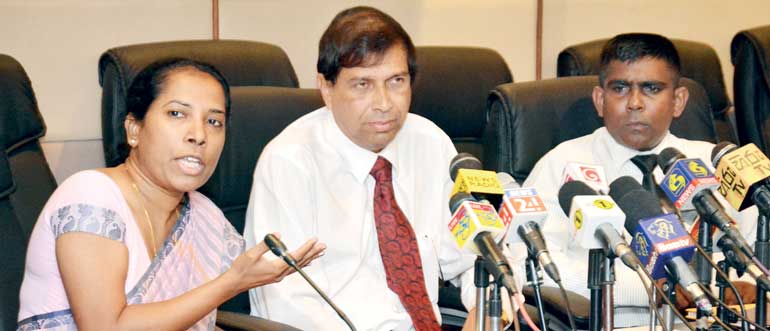Wednesday Feb 25, 2026
Wednesday Feb 25, 2026
Saturday, 29 October 2016 00:02 - - {{hitsCtrl.values.hits}}
 From left: Department of Fiscal Policy Tax Policy Advisor Thanuja Perera, Department of Fiscal Policy Director General A.K.Seneviratna and Department of Fiscal Policy Assistant Director K.K. I Eranda Addressing Media - Pic by Upul Abayasekara
From left: Department of Fiscal Policy Tax Policy Advisor Thanuja Perera, Department of Fiscal Policy Director General A.K.Seneviratna and Department of Fiscal Policy Assistant Director K.K. I Eranda Addressing Media - Pic by Upul Abayasekara
By Charumini de Silva
Cashing in on the long delayed VAT increase, tax officials yesterday outlined Government targets of collecting additional revenue of Rs.100 billion from the VAT increase to 15% per annum, while also expecting total VAT revenue by the end of next year to be a higher than average Rs.380 billion.
The Finance Ministry expects total tax revenue to reach Rs.1,600 billion by the end of this year, hoping it would go up to Rs.1,900 billion next year as tax officials continue to broaden the tax base.
It was pointed out that all three key tax collecting institutions, namely the Inland Revenue Department, Sri Lanka Customs and Excise Department, have shown a significant progress in efficient revenue collection with an average takings improvement of 27%.
Department of Fiscal Policy Director General A. K. Seneviratne in a special press briefing held on Friday said that the 15% VAT and the 2% Nation Building Tax (NBT) would be implemented from 1 November to increase Government revenue.
Noting that there are only 15,000 VAT registered companies and 23,000 registered companies for NBT against millions of businesses in the country, he stressed that implementation of the Revenue Administration and Management Information System (RAMIS) would significantly assist the Government in widening the tax payer net.
After several amendments, the threshold on retail and wholesale trade shall be Rs.12.5 million per quarter or Rs.50 million per annum, while the threshold for other services for the registration for VAT shall be Rs.3 million per quarter or Rs.12 million per year. Importers, goods manufacturers and service providers are liable to pay VAT.
The telecommunication sector has been slapped with several taxes including a 2% CESS, 25% telecommunication levy, 2% NBT and 15% VAT. “Assume it is a Rs.100 bill and with all these taxes the total comes to Rs.144. Out of the total bill Rs. 100 is paid by the service provider, while the balance Rs. 44 is only passed onto the customer — which means it only passes on one third of the tax to the consumer,” he contended adding the telecommunication levy for internet has remained unchanged at 10%.
While the OPD services, diagnosis tests, dialysis, theater charges are exempted from VAT, doctor’s channeling fee and room charges imposed by private hospitals would include VAT, said Department of Fiscal Policy Tax Advisor Tanuja Perera said.
She further said that there would be no VAT imposed on locally produced milk powder, while all imported milk powders are liable for VAT. In addition, she stressed that although it is locally manufactured if there are products which include sugar, those products are considered as value added products and are liable for VAT.
The officials assured that although there is an added 2% NBT on the electricity bills, it would not impact the consumers as the 2% NBT would be collected from the Ceylon Electricity Board (CEB). They also added that there is no VAT imposed on private education.
When questioned whether the VAT increase is a temporary measure, as the Finance Minister had told Parliament, Department of Fiscal Policy Assistant Director K. K. I. Eranda said: “Our policy is to increase direct taxes and reduce indirect taxes in the long term. Thereby, the implementation of VAT is just one step in moving towards that policy. Going forward, we expect to adjust the limits and percentage to increase direct taxes. We hope to have a quantitative increase in the direct taxes with the implementation of RAMIS.”